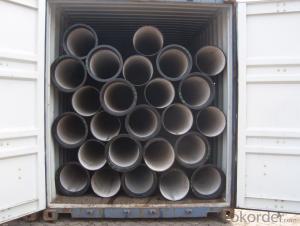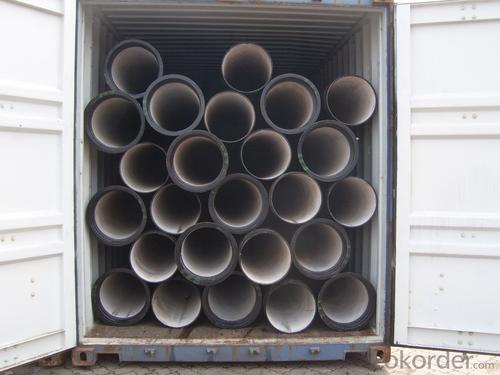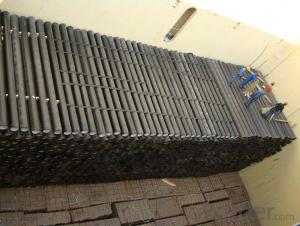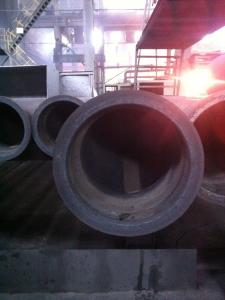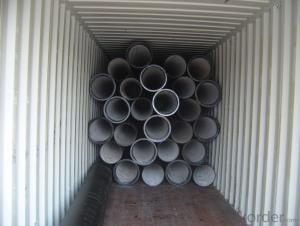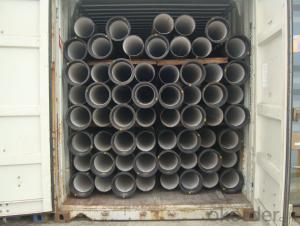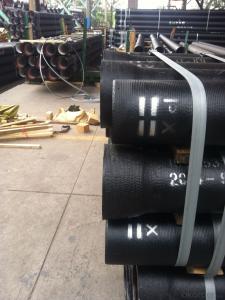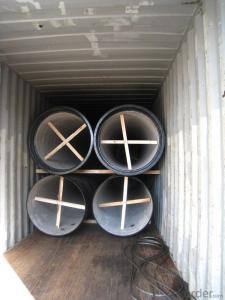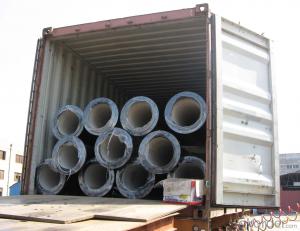DUCTILE IRON PIPES AND PIPE FITTINGS K8 CLASS DN1200
- Loading Port:
- Tianjin
- Payment Terms:
- TT OR LC
- Min Order Qty:
- 22 pc
- Supply Capability:
- 3000 pc/month
OKorder Service Pledge
OKorder Financial Service
You Might Also Like
Material : Ductile Cast Iron
Size Range : DN 80mm to DN 2000mm
Unit Effective Length : 6m or 5.7m
Manufacture Standard: ISO 2531:1998/ EN 545:2006/EN 598:2007
Annual capacity : 200,000 tons
Coating Exterior: Zinc 130g/m2 according to ISO 8179-1 and bitumen coating 70 microns.
Cement Interior: Portland Cement/ High Alumina Cement/ Sulphate Resisting Cement Lining according to ISO 4179
Special requirements on external coating and internal lining can be applied
We also provide accessories such as SBR/EPDM rubber gaskets, lubricant paste, pipe caps, PE sleeves, etc.
Additional Parts:
Each pipe is strictly inspected according to related standard to ensure permanently high performance.
Easy Installation at site and service free for life
Long Service Lifespan
Quotation will arrive you within 24hours once we get your inquiry.
We guarantee offering you a competitive price.
A copy of original inspection reports of pipes will be offered after shipment.
Photos of loading process will be sent to the customer after shipment effect.
We will follow-up the delivery progress after shipment effect and update to the customer on weekly basis.
- Q: How do ductile iron pipes handle traffic vibrations?
- Ductile iron pipes possess exceptional strength and durability, making them highly effective in managing traffic vibrations. Their inherent properties enable them to withstand fractures or cracks caused by external forces, such as vibrations induced by traffic. The pipes' remarkable tensile strength and elasticity allow them to absorb and dissipate the energy produced by traffic vibrations. This capability minimizes the impact on the pipes and prevents significant damage or failure. Moreover, the material's ductility enables it to deform slightly under stress without breaking, further enhancing its ability to endure vibrations. Additionally, ductile iron pipes exhibit superior resistance to corrosion and other forms of deterioration. This resistance guarantees the pipes' structural integrity over an extended period, even when subjected to repetitive vibrations caused by heavy traffic. In conclusion, ductile iron pipes are well-suited to handle traffic vibrations due to their robust nature, capacity to absorb energy, and resistance to corrosion. These characteristics establish them as a dependable choice for underground infrastructure in areas with high traffic volumes, ensuring a pipeline system that is durable and efficient in the long run.
- Q: Can ductile iron pipes be used in areas with high soil acidity?
- Yes, ductile iron pipes can be used in areas with high soil acidity. Ductile iron is highly resistant to corrosion, including the effects of soil acidity, making it a suitable choice for such environments.
- Q: Can ductile iron pipe be used for wastewater treatment plants?
- Yes, ductile iron pipe can be used for wastewater treatment plants. Ductile iron pipe is a strong and durable material that is resistant to corrosion and abrasion. It is commonly used in wastewater treatment plants due to its ability to handle the harsh and corrosive environment often found in these facilities. Ductile iron pipe is also known for its excellent hydraulic performance, making it suitable for transporting wastewater efficiently and effectively. Additionally, the ease of installation and maintenance of ductile iron pipe make it a practical choice for wastewater treatment plants. Overall, ductile iron pipe is a reliable and cost-effective option for wastewater treatment applications.
- Q: Principles for the antiseptic treatment of ductile iron pipes
- Anti corrosion process of ductile iron pipe:1. asphalt paint coatingBituminous paint coatings are pipes used to carry gas. Preheating the pipe before spraying can improve the adhesion of asphalt paint and accelerate drying.2. cement mortar lining + special coatingThe internal corrosion prevention measures are suitable for pipes conveying sewage, and the corrosion resistance of lining can be improved.3. epoxy coal tar coatingThe epoxy coal tar coating is not only suitable for gas pipelines, but also for sewage pipes. It is a two component coating with a high adhesion and a very smooth surface
- Q: What is the expected buoyancy of ductile iron pipes?
- The expected buoyancy of ductile iron pipes is minimal due to their high density and weight.
- Q: Are ductile iron pipes resistant to seismic events?
- Generally, ductile iron pipes exhibit resistance to seismic events. Ductile iron, a form of cast iron known for its strength and durability, can withstand external forces, including those induced by seismic events like earthquakes. The design of ductile iron pipes allows for flexibility, enabling them to absorb and dissipate energy from seismic waves. This flexibility ensures the pipes remain intact despite ground movements and vibrations, preventing any breakage or cracking. Moreover, the joints of these pipes are designed to offer some level of flexibility, further enhancing their ability to withstand seismic events. Furthermore, the construction of ductile iron pipes involves thick walls, providing them with exceptional structural integrity. This strength reduces their susceptibility to damage during seismic events and ensures a consistent flow of fluids, such as water, even in extreme conditions. Nonetheless, it is crucial to recognize that the resistance of ductile iron pipes to seismic events can depend on various factors. These factors include the magnitude and proximity of the earthquake, the quality of installation and maintenance, and the specific design considerations for the pipeline system. Consequently, it is vital to adhere to proper engineering and construction practices to optimize the resilience of ductile iron pipes in areas prone to seismic activity.
- Q: Are ductile iron pipes resistant to chemicals?
- Generally, ductile iron pipes exhibit resistance to chemicals. Ductile iron, a variety of cast iron, is fortified with small amounts of magnesium to enhance its strength and ductility. This alloying process effectively heightens its ability to withstand corrosion and chemical attack. Ductile iron pipes have found extensive use in multiple applications, such as water supply, wastewater treatment, and industrial piping systems, where they may encounter a range of chemicals. Nevertheless, it is crucial to acknowledge that the resistance of ductile iron pipes to chemicals can vary based on the specific type and concentration of the chemical in question. Thus, it is advisable to seek guidance from the manufacturer or a qualified engineer to ascertain the suitability of ductile iron pipes for a particular chemical application.
- Q: Are ductile iron pipes suitable for trenchless pipe bursting methods?
- Yes, ductile iron pipes are suitable for trenchless pipe bursting methods. They have the necessary strength and flexibility to be effectively burst and replaced without the need for extensive excavation.
- Q: What are the advantages of using ductile iron pipe?
- There are several advantages of using ductile iron pipe in various applications. Firstly, ductile iron pipe is known for its exceptional strength and durability. It has a higher tensile strength and yield strength than other types of pipes, making it resistant to cracking, bending, and breaking. This strength allows it to withstand high-pressure and heavy-load conditions, making it ideal for applications such as water and sewage systems, oil and gas pipelines, and industrial piping. Secondly, ductile iron pipe has excellent corrosion resistance. It is coated with a protective layer, usually zinc or epoxy, which prevents rusting and corrosion. This coating ensures a longer lifespan for the pipe, even in harsh environments or when transporting corrosive fluids. Another advantage of ductile iron pipe is its flexibility. Unlike rigid pipes, ductile iron pipes have a certain degree of flexibility, allowing them to withstand ground movement and settle without breaking. This flexibility is particularly beneficial in areas prone to earthquakes or soil settlements. Additionally, ductile iron pipe has a smooth inner surface, which helps to minimize flow resistance and improve the efficiency of fluid transportation. It also reduces the likelihood of sediment buildup or corrosion on the pipe's interior, resulting in improved flow rates and reduced maintenance. Furthermore, ductile iron pipe is cost-effective in the long run. Although it may have a higher initial cost compared to other types of pipes, its durability and low maintenance requirements make it a more cost-effective choice over time. The extended lifespan of ductile iron pipe reduces the need for frequent replacements and repairs, resulting in lower overall life-cycle costs. Lastly, ductile iron pipe is environmentally friendly. It is made from recycled materials, and its long lifespan reduces the need for frequent replacements, thus reducing the carbon footprint associated with manufacturing and transportation. In conclusion, the advantages of using ductile iron pipe include its exceptional strength, corrosion resistance, flexibility, smooth inner surface, cost-effectiveness, and environmental friendliness. These qualities make it a reliable and preferred choice for a wide range of applications in various industries.
- Q: What is the DN400 installation charge for ductile iron pipes?
- The wages paid under special circumstances: refers to the provisions of the state laws, regulations and policies, due to illness, injury, maternity leave, family planning leave, funeral leave, leave, leave, leave, regular shutdown, implementation of national or social obligations due to pay a certain percentage of wage hourly wage or salary when.
Send your message to us
DUCTILE IRON PIPES AND PIPE FITTINGS K8 CLASS DN1200
- Loading Port:
- Tianjin
- Payment Terms:
- TT OR LC
- Min Order Qty:
- 22 pc
- Supply Capability:
- 3000 pc/month
OKorder Service Pledge
OKorder Financial Service
Similar products
Hot products
Hot Searches
Related keywords
